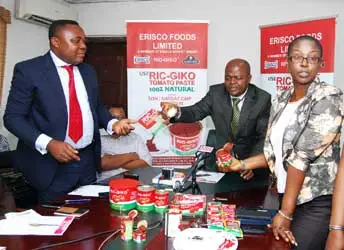
Experts have raised concerns about the safety of tomato paste, stating that it could potentially lead to cancer and other diseases. These concerns were discussed at a recent meeting in Lagos, where importers of tomato paste from China gathered with representatives from Erisco Foods and the National Agency for Food and Drug Administration and Control (NAFDAC).
The meeting was held in response to the discovery that certain individuals were selling starch and coloring in the guise of tomato paste, posing a serious health risk to consumers.
According to the President of Erisco Foods, Chief Eric Umeiofia, a survey conducted by NAFDAC confirmed that the tainted tomato paste contained carcinogenic coloring, making it unfit for consumption. He added that the starch found in these products is particularly harmful to individuals with diabetes. Importers have been using banned synthetic coloring agents to attract customers with their vibrant, but potentially dangerous, products. Ultimately, Umeiofia stressed that consuming substandard tomato paste increases the risk of cancer for both individuals and their families.
Umeiofia also emphasized the importance of consuming wholesome tomato paste, such as RIC-GIKO, which contains lycopene, a natural pigment found in red fruits and vegetables. Lycopene has been scientifically proven to possess potent antioxidant properties, neutralizing free radicals and reducing the risk of cancer and other non-communicable diseases (NCDs).
On the other hand, substandard tomato paste has been found to contain little to no lycopene, and the banned coloring agents used by importers cannot be effectively eliminated from the body. These coloring agents can build up in veins, arteries, and vital organs, leading to the development of cancer, hypertension, and other diseases. Additionally, these coloring agents have been linked to poor neurological development in children, resulting in hyperactivity, poor concentration, and hindered educational progress.
Umeiofia advised Nigerians to support local manufacturers, particularly in the food sector, and urged the Nigerian government to encourage indigenous businesses, including those producing tomato paste. Supporting this sentiment, Dr. Paul Orhii, the Director General of NAFDAC, endorsed RIC-GIKO tomato paste and stressed the need for a study on the quality of tomato paste imported from China to Nigeria.
Tomato paste is widely consumed globally, both in its raw form and as a key ingredient in various processed products such as juices, sauces, purees, pastes, and canned tomatoes. Given its economic importance and widespread use in the food industry, ensuring the safety and quality of tomato paste is crucial.











